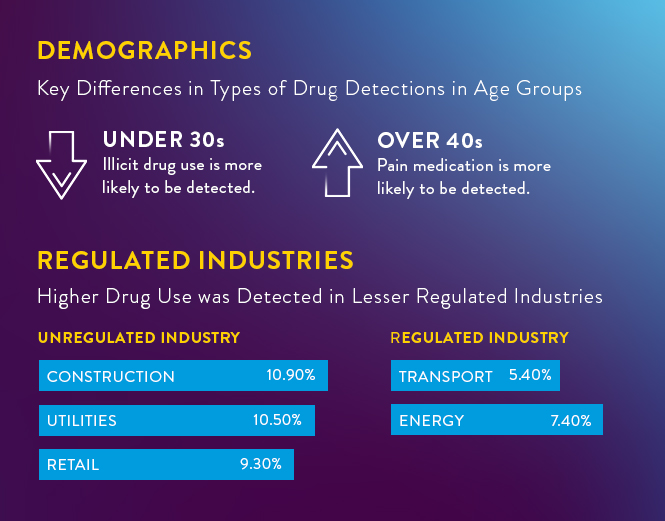TOXICOLOGY
The Value of Random Drug Testing



Drug use in the UK is on the rise. The Drug Misuse in England and Wales: year ending June 2022 report was conducted by the Office of National Statistics and published by the Home Office.
It identified that around one in 11 (9.2%) adults aged 16 to 59 had taken a drug in the last year and around 2.6% of adults within the same age bracket were classified as “frequent” users, meaning they had taken a drug more than once a month over the past year. This increases with adults aged 16 to 24 to one in five (18.6%) having taken a drug in the last year.1
So how does this affect the workplace? If a worker is under the influence of drugs or alcohol at work, it can lead to an accident, which could result in reduced productivity, increased insurance premiums, and, most importantly, a serious injury or fatality.
Implementing a random drug testing programme not only helps to drive a safer workplace but also send a strong message to customers and employees that safety is of paramount importance.
What do Drug Detection Rates Tell Us?
Data from Abbott’s toxicology business, testing on behalf of UK Employers, has shown a drug detection rate on average of 7% from the samples tested.* This means that one worker in every 14 could be reporting for work whilst unfit to do so. That equates to 2.2 million people in work in the UK at any given time.2
The data includes some other significant findings. It shows that cannabis and powder cocaine are the most used drugs. It also reflects the importance of considering demographics and whether an industry is regulated and has regulated drug testing.

Although random drug testing has a proven history of effectiveness, some industries place restrictions on how random testing can be conducted. Random drug testing removes the notice that other forms of testing, such as pre-employment, can provide, and removes the allowance to get clean to pass the test. Random testing is exactly that random.
By removing this notice and making employees subject to random testing employers are more likely to provide a true picture of employees using drugs. As a result, employers will be able to better manage the risk to their business, helping to create a safer, healthier, and more productive workplace.
What Other Benefits Can Come from Random Testing?
The unannounced random testing of employees is a key part of managing the risks of drug and alcohol use in the workplace. The company strategy for risk management of drug and alcohol use should be comprehensive and include support, awareness, education, and training as well as control measures such as pre-employment, for cause, and random testing so that employees have the necessary tools to contribute to the reduced risk.
Random testing is a good way to assess the ongoing effectiveness of the company strategy and drug and alcohol testing policy. For example, an increase in positivity rates from random testing when started can be used as a benchmark for ongoing review and assessment. Ongoing random testing also keeps the drug and alcohol policy fresh in the minds of employees. The constant possibility of being tested can also act as a deterrent for those who may be tempted to continue using drugs and alcohol in a way that poses a risk to the company.
However, to maintain the deterrent factor, consideration should be given to the proportion of employees who are tested, since testing at a low proportion of 5% of employees per year means that the likelihood of an individual being tested is once every 20 years, for example. Creating the correct balance here can help ensure that the testing has an effective impact on company culture and safety.
A Safer Workplace for All
With drug use increasing and the stark reality that drug use is happening across the UK, a random drug testing programme can help ensure the safety of a workplace.
If safety is improved, productivity may increase, and ultimately, companies can see an improvement in their bottom line.
References
- “Drug misuse in England and Wales: year ending June 2022.” National Statics Office / Home Office, https://www.ons.gov.uk/peoplepopulationandcommunity/
crimeandjustice/articles/drugmisuseinenglandandwales/yearendingjune2022.
Accessed 14 July 2023.
- Abbott data on file from 2016.
*Please note these positive screens could also be due to legitimate medication.


.jpg)

